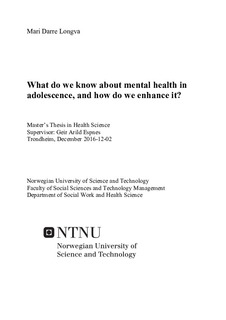| dc.description.abstract | As a nurse one of my main tasks is to communicate and provide patients with health information. During this master's program I have become further interested in health literacy, and its potential in health promotion. Furthermore, my interest for mental health and how the foundation of mental health is created, led me into the theme of this project. Given this background, the aim of this thesis is to raise awareness and enhance knowledge about what creates positive mental health in adolescence. This Master's thesis consists of two parts. The first section presents a literature review exploring factors influencing adolescents’ mental health positively. The second part is a qualitative empirical study exploring Norwegian adolescents experience with positive mental health, where positive mental health factors are examined and placed within a scale measuring knowledge about mental health promotion.
Article I: The purpose of this review is to explore the factors promoting mental health in adolescence. This review provides a brief introduction to health promotion and mental health literacy, and connects this to the three basic psychological needs within Self-Determination Theory (SDT), which will function as the theoretical framework for this article. There appears to be a various of factors promoting mental health in adolescence within an ecological context, where social support appears evident at every level. The three psychological needs appear to coincide with the findings, where SDT offers an explanation to why these factors are of importance. In addition, the need for adding a health promoting component to mental health literacy is highlighted.
Article II: The study’s primary object is to explore which elements of positive mental health adolescents are aware of, and believe are important in promoting their mental health. The adolescents will discuss a scale meant to measure youths’ knowledge of mental health promotion. This phenomenological study includes focus group interviews with 21 Norwegian adolescents, aged 16 to 19 years old. To analyse the material of this study Systematic Text Condensation was used. The findings of this study revealed ‘mental health’ to be difficult to define, where mostly negative associations were mentioned. Social support from family and friends, and a sense of self-worth were essential determinants for the youths’ mental health. Regarding the scale, the adolescents’ perceptions of important factors for mental well-being seem to concur with the basic psychological need for: competence, autonomy and relatedness. This study combines Health Promoting aspects and a theory within Positive Psychology. By bringing these disciplines together, a broader understanding of mental health in adolescence might be fostered. | nb_NO |
